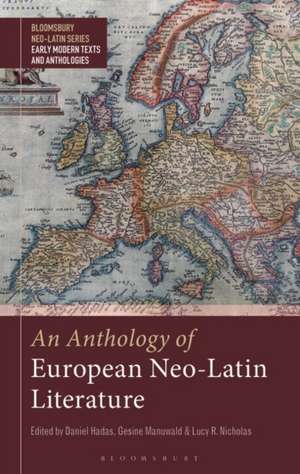An Anthology of European Neo-Latin Literature: Bloomsbury Neo-Latin Series: Early Modern Texts and Anthologies
Editat de Dr. Gesine Manuwald, Daniel Hadas, Dr Lucy R. Nicholasen Limba Engleză Paperback – 30 sep 2020
| Toate formatele și edițiile | Preț | Express |
|---|---|---|
| Paperback (1) | 225.49 lei 6-8 săpt. | |
| Bloomsbury Publishing – 30 sep 2020 | 225.49 lei 6-8 săpt. | |
| Hardback (1) | 656.90 lei 6-8 săpt. | |
| Bloomsbury Publishing – 30 sep 2020 | 656.90 lei 6-8 săpt. |
Preț: 225.49 lei
Preț vechi: 258.80 lei
-13% Nou
Puncte Express: 338
Preț estimativ în valută:
43.15€ • 44.58$ • 35.91£
43.15€ • 44.58$ • 35.91£
Carte tipărită la comandă
Livrare economică 25 martie-08 aprilie
Preluare comenzi: 021 569.72.76
Specificații
ISBN-13: 9781350157293
ISBN-10: 1350157295
Pagini: 328
Dimensiuni: 138 x 216 x 21 mm
Greutate: 0.41 kg
Editura: Bloomsbury Publishing
Colecția Bloomsbury Academic
Seria Bloomsbury Neo-Latin Series: Early Modern Texts and Anthologies
Locul publicării:London, United Kingdom
ISBN-10: 1350157295
Pagini: 328
Dimensiuni: 138 x 216 x 21 mm
Greutate: 0.41 kg
Editura: Bloomsbury Publishing
Colecția Bloomsbury Academic
Seria Bloomsbury Neo-Latin Series: Early Modern Texts and Anthologies
Locul publicării:London, United Kingdom
Caracteristici
First accessible and affordable reader of European Neo-Latin literature, with a representative selection expertly chosen to inspire study of later Latin
Notă biografică
Daniel Hadas is Lecturer in Medieval Latin at King's College London, UK. His research interests centre around Latin patristics, the development of post-classical Latin, and manuscript culture and textual criticism.Gesine Manuwald is Professor of Latin at University College London, UK, and President of the Society for Neo-Latin Studies. She has published a number of articles on early modern Latin literature and co-edited the collected volume Neo-Latin Poetry in the British Isles (Bloomsbury, 2012).Lucy R. Nicholas is a Teaching Fellow in Classics at King's College London and the Warburg Institute, University of London, UK. She has published on Roger Ascham and written on other early modern Latin authors, including Thomas More and Walter Haddon, and also co-edited Themes of Polemical Theology Across Early Modern Literary Genres (2016) with Andrea Riedl Svorad Zavarský. She is the Treasurer of the Society for Neo-Latin Studies.
Cuprins
List of contributorsPrefaceINTRODUCTION(Lucy R. Nicholas, King's College London, UK and William M. Barton, Ludwig Boltzmann Institute for Neo-Latin Studies, Austria) 1 European Neo-Latin and its development 2 Neo-Latin as a literary medium 3 Neo-Latin literature and its genres 4 Aims and coverage of this volume 5 Latin texts: sources and conventions 6 Bibliography TEXTS 1 A pastoral exchange on the treatment of poetryBattista Spagnoli Mantovano (1447-1516), Adolescentia 5.1-23, 68-91, 111-25 (Bobby Xinyue, University of Warwick, UK) 2 The pierced ear: divine revelation and impregnation Jacopo Sannazaro (1458-1530), De partu Virginis, extracts from Book 1 (Lucy R. Nicholas, King's College London, UK) 3 The abbot and the learned woman Desiderius Erasmus (1466-1536), Colloquia (Abbatis et Eruditae) (Astrid Khoo, Harvard University, USA) 4 Christopher Columbus' first voyage Pietro Bembo (1470-1547), Rerum Venetarum historiae libri, extracts from 6.1-3 (Gareth Williams, Columbia University, USA) 5 Morbid measures and contaminated airs: the poetics of pox Girolamo Fracastoro (1476/8-1553), Syphilis sive de morbo Gallico, extracts (Gareth Williams, Columbia University, USA) 6 A Protestant on the attack in Latin Martin Luther (1483-1546), De abroganda missa privata (Lucy R. Nicholas, King's College London, UK) 7 Greeting Charles at Bordeaux George Buchanan (1506-1582), Silvae 1 (Stephen J. Harrison, University of Oxford, UK) 8 Epistolae Obscurorum Virorum (1515-1519), Letter 1.37: The converted Jew and his foreskin (Daniel Hadas, King's College London, UK) 9 The pleasures of the hills Conrad Gessner (1516-1565), Descriptio Montis Fracti sive Montis Pilati, pp. 47-9 (William M. Barton, Ludwig Boltzmann Institute for Neo-Latin Studies, Austria) 10 Neo-Latin love elegy Joachim Du Bellay (c. 1522-1560), selection from Amores (1558) (Paul White, University of Leeds, UK) 11 A Jesuit encounter with an Indian Yogi Francesco Benci (1542-1594), Quinque martyres 5.96-132 (Paul Gwynne, The American University of Rome, Italy) 12 Mary, liturgy and missions Francisco Enzinas' Correspondence with Robert Bellarmine (1605-1607) (Jan Machielsen, Cardiff University, UK) 13 Seneca's death dramatized Matthew Gwinne (1558-1627), Nero: Nova Tragaedia (1603), Act 5, Scene 6 (Emma Buckley, St Andrews University, UK) 14 Virgilian commentary Juan Luis de la Cerda (1558/60-1643), on Aeneas' first appearance in the Aeneid (Fiachra Mac Góráin, University College London, UK) 15 Vitalist philosophy from a long lost authorAnne Conway (1631-1679), Principia philosophiae antiquissimae & recentissimae, excerpts from Chapter VII (Laurynas Adomaitis, Scuola Normale Superiore di Pisa, Italy) 16 A new approach to studying old documents Jean Mabillon (1632-1707), De re diplomatica, extracts (Alfred Hiatt, Queen Mary, University of London, UK) 17 Newton on theology Isaac Newton (1642-1727), theological section from the General Scholium to the Principia mathematica (Pablo Toribio, Spanish National Research Council, Spain) 18 Damnation and divine justice Gottfried Wilhelm Leibniz (1646-1716), Confessio philosophi, extract (Lucy Sheaf, King's College London, UK) 19 A school play Gottlob Krantz (1660-1733), Memorabilia Bibliothecae .Wratislaviensis, excerpts from Acts I and IV (Jacqueline Glomski, University College London, UK) Index
Recenzii
This anthology provides an excellent introduction to a wide-range of Latin writing from the pivotal centuries after the introduction of the printing press. You'll find in it a treasure trove of excerpts from famous and fascinating authors sure to delight anyone interested in European learning and letters.









